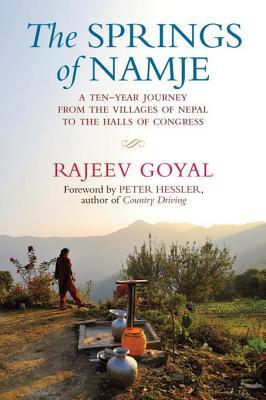
The Springs of Namje
A Ten-Year Journey from the Villages of Nepal to the Halls of Congress
کتاب های مرتبط
- اطلاعات
- نقد و بررسی
- دیدگاه کاربران
نقد و بررسی

June 4, 2012
In 2001, 52 days after a brutal mass murder decimated the Nepalese royal family, Goyal, an idealistic and deeply naïve Peace Corps volunteer, arrived in the violently divided Himalayan nation, hoping to better the lives of the people in the remote villages to which he was assigned. Grand if vague ambitions soon stumble over the realities of Nepal in the early 21st century, from the way its entrenched caste system affects all aspects of life to the escalating civil war between the out-of-touch monarchy and the rest of the country. Determined to see the Peace Corps become an even greater force for good, in 2008, Goyal ventures into darkest Washington with every bit of the idealism and energy he demonstrated in Nepal and similar, inexplicable naïveté. In addition to relating his time in Nepal, this heartfelt account addresses his struggles with Washington’s blinkered functionaries, doctrinaire reactionaries, and the frustrating Obama administration, though Goyal’s apparent ignorance about the government of his own nation is baffling. However, despite setbacks and ambivalence about the changes he helped create in Nepal, Goyal remains a persuasive optimist about the effect a small group of highly motivated people can have on the world.

July 1, 2012
A Peace Corps veteran recounts his experiences in a small Nepalese village. Goyal, a lawyer, activist and specialist in rural development, narrates his life journey since he arrived in the town of Namje in 2001, discussing the projects in which he was involved and the skills he needed to acquire to become an effective volunteer and teacher in the village, where school-age girls carried water up the mountain from its source. Realizing that he had "to do something about this water crisis" so the children could come to school, he worked on solving the problem with the Peace Corps' help. Recruited by villagers who had heard of his success at law school in the United States, Goyal returned in 2004 to build three schools. When he returned to the U.S. in 2008, he was hired as a lobbyist to work on doubling the Peace Corps budget. In addition to discussing his projects, the author examines similarities between Nepal and the U.S.; in both countries, he writes, "politics is not all that different from community organizing." Congress became his village as he sought out how to get "directly to the highest power," by catching congressmen and senators in corridors, "strategic loitering," networking and using social media to mobilize citizen support. Goyal puts into sharp relief the Peace Corps' funding within the total U.S. budget, and he punctuates his tale with instances of unfulfilled promises and unforeseen circumstances. An interesting adventure with a good lesson: that having lots of money is not a prerequisite to accomplishing great things.
COPYRIGHT(2012) Kirkus Reviews, ALL RIGHTS RESERVED.

September 15, 2012
Goyal, the son of Indian immigrants, joined the Peace Corps and was assigned to teach English in the small village of Namje in eastern Nepal. In this very frank memoir of the hardships, failures, and successes, he recalls dealing with the discomforts of the caste system and learning that supposedly ignorant villagers had skills and knowledge helpful to developing their communities and nations. He is brutally honest about the unintended consequences of well-meaning efforts, such as building a water pump system to pull water up the mountain, a project that likely brought the villagers into contact with Maoist rebels. When his service ended, Goyal remained involved in issues of development, including boosting funding for the Peace Corps. He tells the story of his 10-year journey as attorney and activist, walking the halls of Congress, shaking hands and securing promises for more funding at a time of budget cutting, eventually securing an additional $60 million for the Peace Corps. An honest and inspiring look at the hard work and reward of development efforts.(Reprinted with permission of Booklist, copyright 2012, American Library Association.)

























دیدگاه کاربران